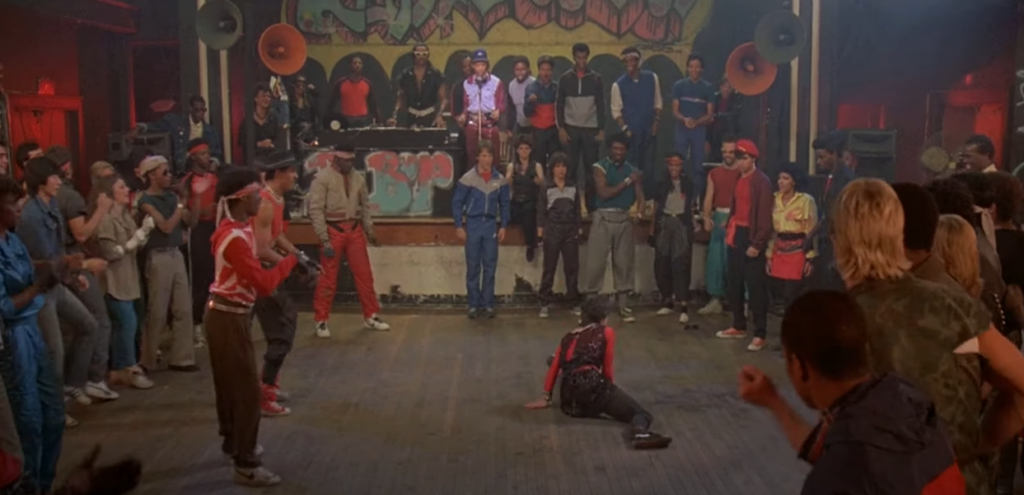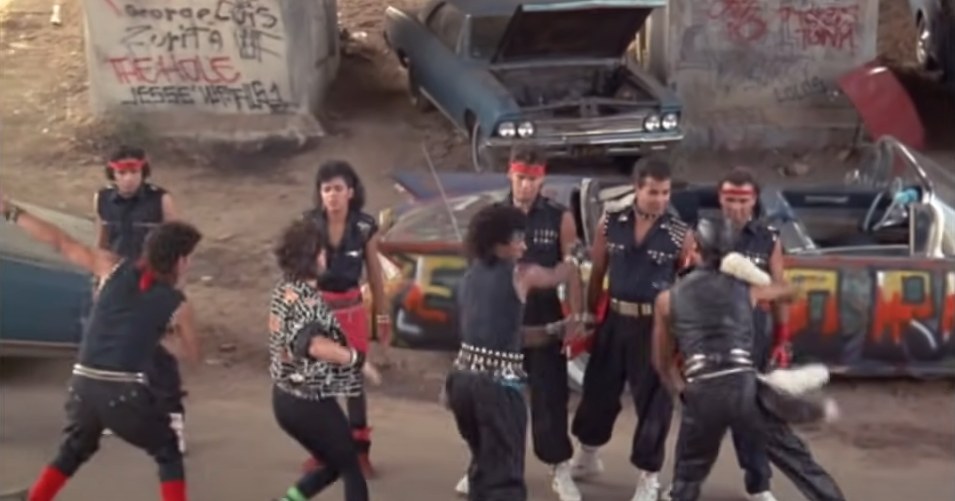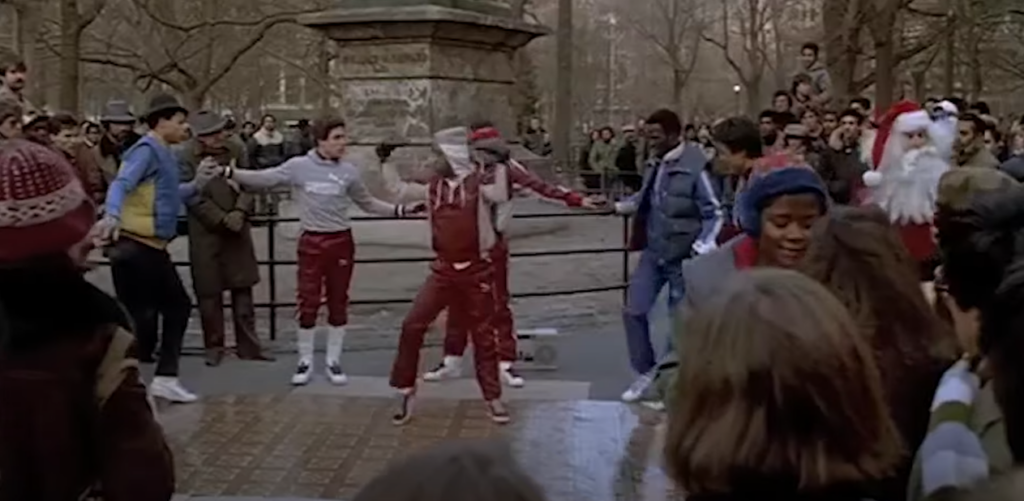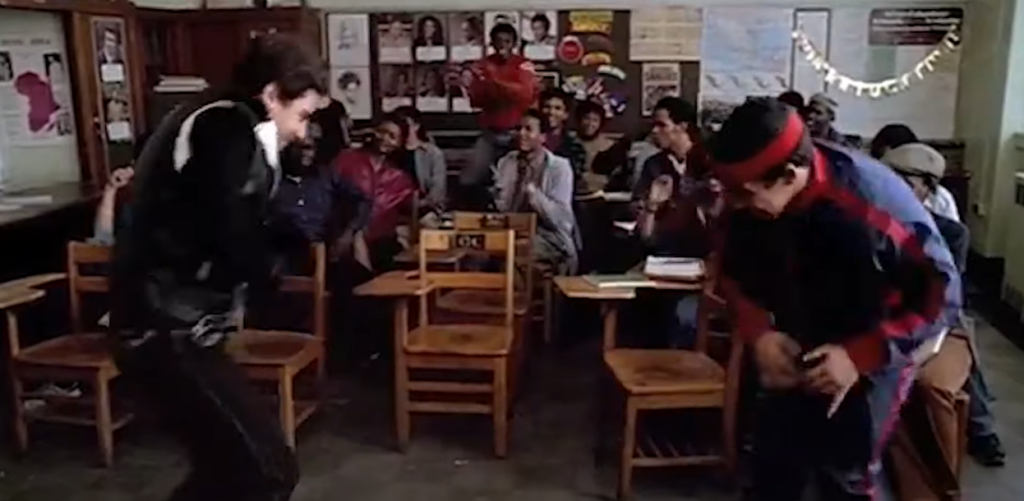The decade of the 1980s was a remarkable period in cinema. It gave birth to several groundbreaking genres, but perhaps one of the most unforgettable was the wave of breakdancing films. Breakdancing, with its unique fusion of gymnastic moves and street dance, was an underground movement that found its way into the mainstream culture, and eventually, onto the big screen. The essence, impact, and legacy of these films continues to resonate today.
Three movies took center stage, defining the era of breakdance in cinema: “Breakin’,” “Breakin’ 2: Electric Boogaloo,” and “Beat Street.”
Breakin’ (1984)

“Breakin’,” directed by Joel Silberg, catapulted breakdance into mainstream consciousness. The movie’s charm lay in its characters and vibrant dance scenes, which introduced viewers to a new kind of dance.
Plot Synopsis
The story revolves around Kelly, a jazz dancer, who meets street dancers Ozone and Turbo. Kelly, Ozone, and Turbo form an unlikely trio, navigating the world of dance and overcoming societal prejudices. The movie culminates in a dance competition where the trio shines, showcasing their breakdancing skills and defying societal norms.
Characters
- Kelly ‘Special K’ Bennett: Played by Lucinda Dickey, Kelly is a struggling jazz dancer who falls in love with breakdance after meeting Ozone and Turbo;
- Orlando ‘Ozone’ Barco: Portrayed by Adolfo “Shabba-Doo” Quiñones, Ozone is a skilled street dancer who inspires Kelly to explore breakdance;
- Tony ‘Turbo’ Ainley: Played by Michael “Boogaloo Shrimp” Chambers, Turbo is Ozone’s breakdance partner, known for his incredible dance moves.
Dance Sequences
| Sequence | Description |
|---|---|
| The Beach Scene | This sequence displays the contrast and eventual fusion between traditional dance and breakdance. |
| The Club Battle | A dramatic dance-off showcasing the raw intensity of breakdance. |
| The Finale Dance | The trio’s ultimate performance, incorporating breakdancing moves with jazz dance, culminating in their triumph. |
Breakin’ 2: Electric Boogaloo (1984)

“Breakin’ 2: Electric Boogaloo” was the immediate sequel to “Breakin’.” Despite a relatively weak plot, the film cemented its place in history due to its vibrant dance sequences.
Plot Synopsis
In this sequel, the trio fights to save a community center from being demolished by a greedy developer. They plan a large fundraiser, filled with energetic and heart-pumping dance sequences, that eventually helps them save the center.
Dance Sequences
- Hospital Scene: A unique sequence where Turbo dances in a hospital, turning a sterile environment into a vibrant dance floor;
- The Street Dance: A pivotal scene where the whole neighborhood unites in a spectacular breakdancing display, symbolizing unity and community spirit;
- The Fundraiser: The final dance sequence, where the characters showcase their best moves to save their community center.
Beat Street (1984)

“Beat Street,” directed by Stan Lathan, offered a gritty and authentic depiction of the breakdancing culture that was closer to its roots.
Plot Synopsis
The story centers on a group of friends in the Bronx, using their talents in breakdancing, DJing, and graffiti art to escape their challenging surroundings.
Characters
- Raymond ‘Ray’ Diaz: Portrayed by Guy Davis, Ray is a dedicated breakdancer and the main protagonist;
- Kenny ‘Double K’ Kirkland: Played by Robbie B., Kenny is a budding DJ and Ray’s older brother;
- Ramo: Played by Jon Chardiet, Ramo is a talented graffiti artist, adding another dimension to the street culture.
Dance Sequences
| Sequence | Description |
|---|---|
| Roxy Battle | An intense dance battle highlighting the competitive nature of breakdance. |
| The Christmas Rap | A unique sequence combining hip-hop and breakdancing, showing the fusion of musical genres in the culture. |
| The Finale | A dance sequence filled with emotion, underscoring the passion and dedication these characters have for their art. |
Impact and Legacy of Breakdancing Movies
Expanding Dance Horizons in Cinema
The dance genre in film has a rich history, and the wave of breakdance movies that surged in popularity during the 1980s left an indelible impact on cinema. This era paved the way for innovative dance techniques, unforgettable performances, and a new dance language to be showcased on the big screen.
In the 1980s, breakdance movies emerged as a dynamic new film genre. The following table outlines some of the most influential films of this period:
| Year | Movie Title | Key Features |
|---|---|---|
| 1980 | “Fame” | The first major film to showcase street dance. |
| 1983 | “Flashdance” | Integrated breakdance into a mainstream film. |
| 1984 | “Breakin'” and “Beat Street” | These two films centered on breakdancing and street culture. |
| 1984 | “Breakin’ 2: Electric Boogaloo” | A sequel that solidified breakdancing in pop culture. |
| 1985 | “Krush Groove” | Explored the interplay between breakdancing and hip-hop music. |
The success and popularity of breakdance movies prompted a wave of dance-oriented films. Some of the more influential include:
- “Dirty Dancing” (1987) – This iconic film combined a classic love story with a rock-and-roll dance style;
- “Save the Last Dance” (2001) – The movie cleverly blends classical ballet with modern hip-hop dance, partially inspired by breakdancing;
- “Step Up” series (2006 – 2014) – The franchise features various dance styles, including contemporary, hip-hop, and of course, breakdance.
Breakdance films had far-reaching impacts beyond the silver screen. They:
- Promoted cultural understanding: By showcasing street dance and hip-hop culture, breakdance movies offered viewers a glimpse into a world that they might not have otherwise encountered. This facilitated a greater understanding and appreciation for diverse cultures and subcultures;
- Inspired a new generation of dancers: These films provided the inspiration for countless young people to explore dance, either as a hobby or a profession;
- Fostered dance innovation: The films pushed boundaries and encouraged creativity in the field of dance. They expanded the dance language by incorporating elements from different styles and cultures.
Breakdance movies of the 1980s opened the door to a wider range of dance-oriented films, promoting cultural understanding and fostering innovation in the world of dance. The influence of these films continues to be seen today, not only in cinema but in the realm of dance and broader cultural exchange.
Cultural Recognition and Global Spread
The popularity of breakdance films has transcended the boundaries of nations, cultures, and languages. The global impact of these films was instrumental in driving the cultural recognition and worldwide spread of breakdance.
Films have a unique way of bridging cultural gaps and connecting audiences around the world. The popularity of breakdance films did exactly this – it shone a spotlight on a dance style that originated in urban streets and propelled it to a global platform. Here are the key milestones:
| Year | Event | Description |
|---|---|---|
| 1980s | Rise of Breakdance Films | Breakdance films such as “Fame”, “Flashdance”, and “Breakin'” emerged, highlighting the art of breakdancing to global audiences. |
| 1990s | Mainstream Acceptance | Breakdance started being recognized as a legitimate art form and not just a fad. Films like “You Got Served” (2004) and the “Step Up” series demonstrated this trend. |
| 2000s | World Dance Competitions | Breakdance became a recognized category in major world dance competitions, signifying its cultural acceptance. |
Breakdance movies left an indelible mark on a generation of viewers and inspired countless individuals to take up dancing. Below are some key impacts:
- Promoting Inclusivity: Breakdance movies presented dance as an art form accessible to anyone, irrespective of their socioeconomic background. This inclusivity resonated with a global audience, inspiring many to learn breakdancing;
- Nurturing Talent: The popularity of these films spurred the creation of dance schools worldwide, nurturing talent and fostering the growth of breakdance as an art form;
- Encouraging Cultural Exchange: These films encouraged a cultural exchange between countries, as local dancers incorporated breakdancing moves into their traditional dances, creating unique blends.
Breakdance films have created a lasting legacy. They:
- Preserved and Promoted Urban Culture: These films documented and amplified the voices of urban communities through the medium of dance, offering an authentic representation of their experiences and art;
- Influenced the Music Industry: The marriage of breakdancing and music in these films influenced the development of music videos, which began incorporating intricate choreography;
- Impacted Fashion Trends: The attire worn by the dancers in these films sparked global fashion trends, specifically in streetwear.
Breakdance films played a pivotal role in the cultural recognition and global spread of breakdance. They not only introduced a new dance language to audiences worldwide but also inspired a generation of dancers, fostering cultural exchange and influencing various industries such as music and fashion. The legacy of these films continues to reverberate in our culture, signifying their enduring impact.
Inspiring New Generations
The legacy of breakdance movies has indeed transcended time. These films continue to inspire new generations and shape modern dance films and culture. Their influence is not just confined to the dance genre but permeates current pop culture as a whole.
The influence of breakdance movies is remarkably evident in contemporary dance films. The following table demonstrates how:
| Year | Film | Inspiration from Breakdance Movies |
|---|---|---|
| 2006 | “Step Up” | Integrated hip-hop and breakdance into its dance sequences. |
| 2008 | “Step Up 2: The Streets” | Focused on street dancing, including breakdancing. |
| 2010 | “Step Up 3D” | Showcased an entire scene dedicated to a breakdance battle. |
| 2013 | “Battle of the Year” | Revolved around an international breakdance competition. |
| 2020 | “Work It” | Incorporated a variety of dance styles, including breakdance. |
The influence of breakdance movies on modern dance culture is profound and multilayered:
- Educating New Generations: Breakdance movies are often the first exposure to the art form for many young people, who learn about its history, its significance, and its techniques through these films;
- Fostering Innovation: These movies continue to inspire dancers to experiment with new moves and styles, combining traditional breakdancing techniques with other dance forms;
- Promoting Competitions: Breakdance battles, a staple in many breakdance movies, have become a significant aspect of modern dance culture. This is evident in reality dance shows and international competitions.
The influence of breakdance movies extends beyond the dance floor into the broader spectrum of pop culture:
- Music Videos: Artists often incorporate breakdance elements in their music videos, continuing the symbiosis between music and breakdance that was popularized by breakdance movies;
- Fashion Trends: Breakdance style, characterized by baggy clothing, bandanas, and sneakers, continues to inspire current streetwear trends;
- Advertising: Advertisers use breakdance for its cool and energetic image, especially in ads targeting young people.
The legacy of breakdance movies is enduring and continually evolving. They inspire not only modern dance films and culture but also influence current pop culture, from music videos to fashion trends and beyond. The unique blend of energy, athleticism, and creativity that breakdance embodies continues to captivate and inspire new generations around the globe.
Comparison of 80s Breakdance Movies

| Movie | Director | Key Characters | Significant Dance Sequences |
|---|---|---|---|
| Breakin’ | Joel Silberg | Kelly ‘Special K’ Bennett, Orlando ‘Ozone’ Barco, Tony ‘Turbo’ Ainley | The Beach Scene, The Club Battle, The Finale Dance |
| Breakin’ 2: Electric Boogaloo | Sam Firstenberg | Kelly ‘Special K’ Bennett, Orlando ‘Ozone’ Barco, Tony ‘Turbo’ Ainley | Hospital Scene, The Street Dance, The Fundraiser |
| Beat Street | Stan Lathan | Raymond ‘Ray’ Diaz, Kenny ‘Double K’ Kirkland, Ramo | Roxy Battle, The |
Conclusion
In the grand scheme of cinematic history, the 1980s breakdance movies left an indelible mark. They brought an underground dance form into the limelight, celebrated youth culture, and spawned a global dance phenomenon. The legacy of these films transcends time and continues to influence dance and pop culture today.
FAQ
Breakdance movies were significant to 80s culture because they brought an underground dance movement into the mainstream. They highlighted youth culture and were instrumental in popularizing hip-hop and street culture.
These movies inspired a new generation of dance films by showcasing dance as not just an art form, but also a way of life and a means of expression. This trend continues in modern dance films.
Breakdancing continues to be a significant part of popular culture. It’s an official sport in the 2024 Paris Olympic Games, and it remains a vital element of hip-hop culture.
